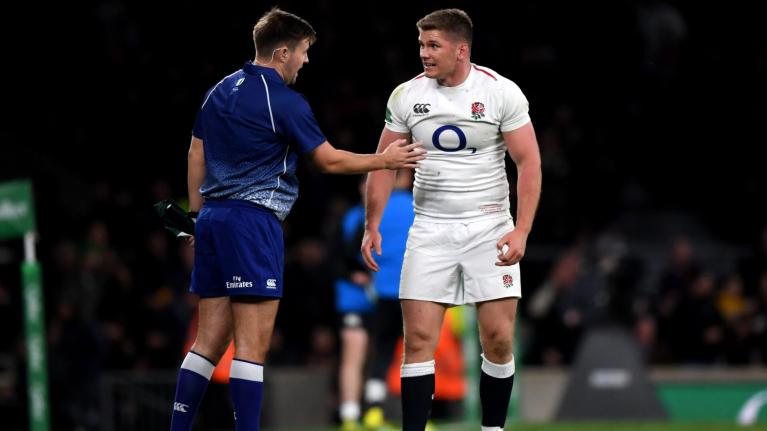Talking Point: Should rugby look to the NFL for post-match sanctions?

It seems as though the controversy over Owen Farrell’s last-minute tackle on Andre Esterhuizen at Twickenham is going nowhere fast.
World Rugby have taken the decision not to cite, but that hasn’t stopped the issue being talked about ad nauseam and whether or not the decision not to cite Farrell will create a precedent moving forward, in regard to the legality of similar tackles.
The clear winners out of this situation are the broadcasters, who can continue to bill England versus New Zealand, or more specifically Farrell vs Beauden Barrett, as a battle of two of the preeminent competitors in international rugby.
One question that has arisen out of the furore surrounding the tackle is that of post-match sanctions in rugby union.
No one is suggesting that World Rugby’s zero tolerance towards contact with the head on the pitch is unfit for purpose. Red cards are a necessary determent to help change the long-term tackling behaviour of players and the adoption of such a hard line is to be praised, even if it has caused short-term confusion.
That said, could rugby learn from the NFL in terms of how it deals with the subsequent punishment of these incidents?
The NFL will rarely ban players from games for on-field misdemeanours, especially when they lack any kind of malicious intent. Unnecessary roughness, hitting a defenceless receiver and other similar penalties will often be treated with an on-field sanction and then the player will receive a monetary fine in the following week.
Continue reading below...
Watch: Eddie Jones
If there is adjudged to be intent and that the player made a conscious decision to act, rather than a reflex, then a short one or two game ban may be handed out, but generally the NFL reserves banning from play sanctions for use of performance-enhancing drugs and violations of the league’s personal conduct policy.
Would this be a preferable outcome in rugby?
Had World Rugby, or referee Angus Gardener, adjudged Farrell to have made contact with Esterhuizen above the shoulder line, and therefore picked up a red card and a multiple-week ban, there is no doubt it would have diminished the upcoming England vs New Zealand contest.
It could be argued that fans, as shareholders in the game, are the ones being punished, as much as the player and the team.
In those situations, would a significant fine – bearing in mind the matchday fee for an England player is £22k – be a better outcome for the game? That money could then be invested in grassroots rugby, be donated to a charitable organisation or, perhaps most apt, be used to fund concussion research?
The flip side of the coin is the argument that it’s the potential cost of letting your teammates down, by your exclusion from important fixtures, that is most likely to change tackling behaviour long-term, not financial losses.
Or, is rugby still at a point where financial losses can dictate behaviour? After all, the earning potential in rugby is much lower than it is in football and the NFL.
It is a debate worth having, at the least.
You may also like: Wallabies Ashley-Cooper and Beale look ahead to Wales
Latest Comments
And nobody in the south is complaining.
Go to commentsCrusader's backline looks like a much more dynamic unit this year and given that they still have a Rolls Royce forward pack I would expect them to go close to winning the competition. Last year was an aberration surely.
Go to comments